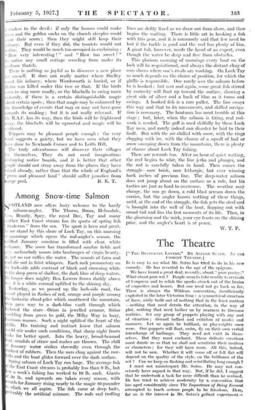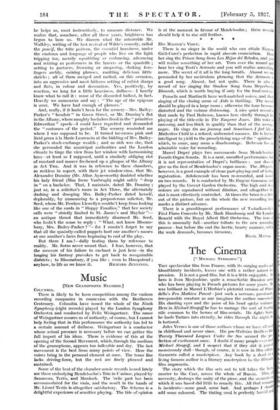The Theatre
[` THE DESPERATE LOVF.R.S." BY ALFRED SCTRO. AT TIM COMEDY THEATnE.] IT is easy to sec what Mr. Sutro has tried to do in his new comedy. He has reverted to the age of the epigram.
We have heard a great deal, recently, about " pure poetry." What about pure wit ? People seem to take readily to revivals of Conireve and to relish the sparks struck out of the brains of coquettes and beaux. But one need not go back so far. There is always the Wildean convention, insufficiently exploited in the later Victorian time : a symmetrical structure of farce, airily built out of nothing that in the least matters —nothing that need detain the attention, in the way of plot, nothing that need bother us by nearness to tiresome realities. Set any group of puppets playing with any sort of situation ; discard ballast and criticism of modes and manners. Let us again be brilliant, as playwrights once were. Our puppets will float, swim, fly on their own verbal interchange of badinage. They need not exist in them- selves. But they must enchant. These delicate creations must dazzle us so that we shall not scrutinize their motives or characters ; for they will have none. All this, indeed, will not be new. Whether it will come off or fall flat will depend on the quality of the style, on the brilliance of the wit ? Can we keep on flashing and scintillating long enough ?
I must not misinterpret Mr. Sutro. He may not con- sciously have argued in that way. But, if he did, I suggest that he undertook a task far more difficult than he realized. He has tried to achieve modernity by a convention that has aged considerably since The Importance of Being Earnest attempted to teach- serious people to be frivolous. Here, for us, is the interest in Mr. Sutro's gallant experiment he helps us, most instructively, to measure distance. We realize that, somehow, after all these years, brightness has begun to bore us. We discern what the admirable Mr. Walkley, writing of the last revival of Wilde's comedy, called the poncif, the trite pattern, the essential heaviness, under the customs and language of people who live on the light tripping toe, merrily squabbling or embracing, advancing and retiring as performers in the lancers or the quadrille ; setting to partners, frowning or simpering, shaking fore-. fingers archly, coining phrases, emitting delieious little shrieks ; all of them merged and melted, on this occasion, into an aggressive and most hideous setting of cubist sharps and flats, in colour and decoration. Yes, positively, by reaction, we long for a little heaviness, dullness—I hardly know what to call it : some of the discarded ballast, in fact. Heavily we summarize and say : "The age of the epigram is over. We have had enough of phrases."
And, really, if it hadn't been for the scenery—Mrs. Bailey- Parker's " boudoir " in Green Street, or Mr. Duminy's flat in the Albany, where naughty bachelors lived in the" primitive Edwardian" epoch—I could have regretted, and demanded the "costumes of the period." The scenery reminded me where I was supposed to be. It turned ice-cream pink and livid green a la Marie Laurencin at the bidding of Mrs. Bailey- Parker's stock-exchange wealth ; and so rich was she, that she persuaded the municipal authorities and the London climate to tinge the view from her window with harmonizing hues—at least so I supposed, until a similarly obliging riot of mustard and mauve freshened up a glimpse of the Albany in Act Two. And it was in reference to these chambers, so reckless in aspect, with their jet window-rims, that Mr. Alexander Duminy (Mr. Allan Aynesworth) doubted whether his lady friend (Miss Irene Vanbrugh) might safely "drop in" on a bachelor. That, I maintain, dated Mr. Dummy; just as, in a solicitor's room in Act Three, the alternately dashing and drooping Mrs. Bailey-Parker dated herself, deplorably, by announcing to a preposterous solicitor, Mr. Seed, whom Mr. Fewlass Llewellyn couldn't keep from looking like one of the cards in "Happy Families," that her society calls were "strictly limited to St. James's and Mayfair "- an antique thrust that immediately disarmed Mr. Seed, who hadn't the sense to reply : "What, not know Blooms- bury, Mrs. Bailey-Parker ? "—for I mustn't forget to say that all the quaintly-called puppets hurl one another's names at one another's faces from beginning to end of the play.
But there I am 1—dully testing them by reference to reality. Mr. Sutro never meant that. I fear, however, that the measure of his failure to enchant is just here—in the longing his fantasy provokes to get back to recognizable districts ; to Bloomsbury, if you like ; even to Hampstead; anyhow, to life as we know it. RICHARD JENNINGS.



























































 Previous page
Previous page